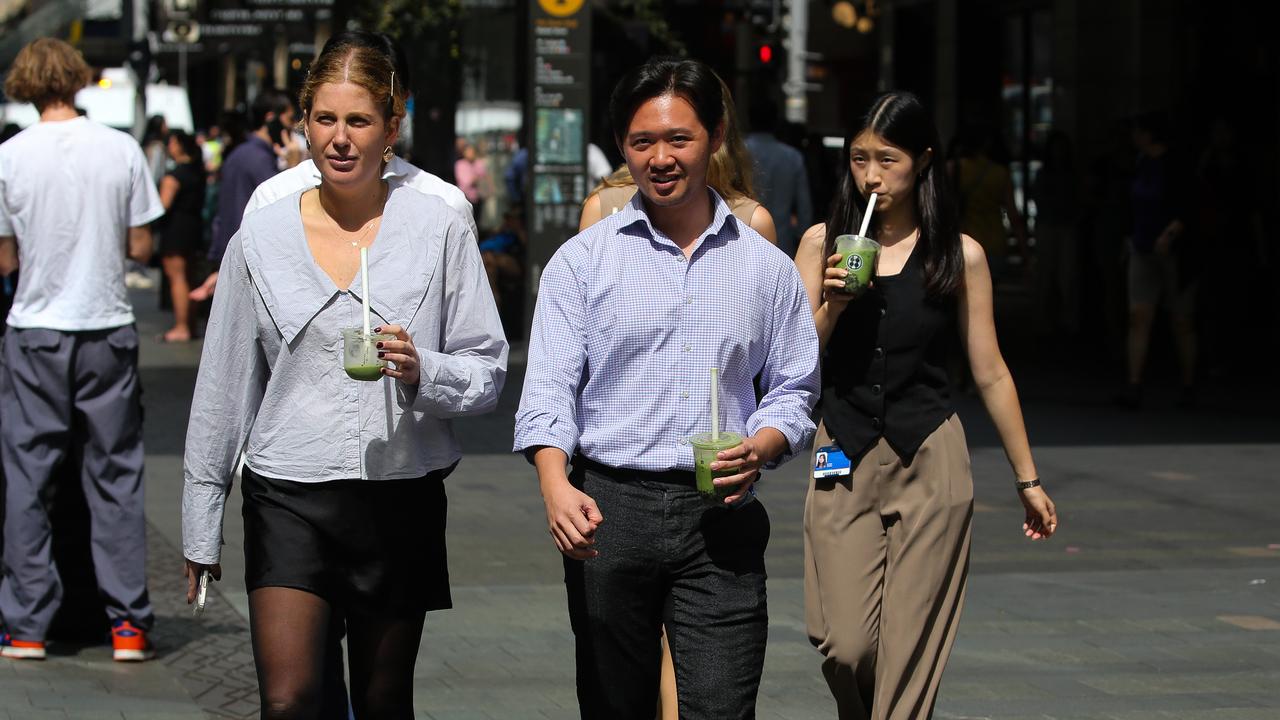Expert warns living with Covid does not mean ignoring virus, as new wave looms
Health experts across Australia have warned against complacency with Covid-19, as a new wave of the disease resistant to vaccines looms.
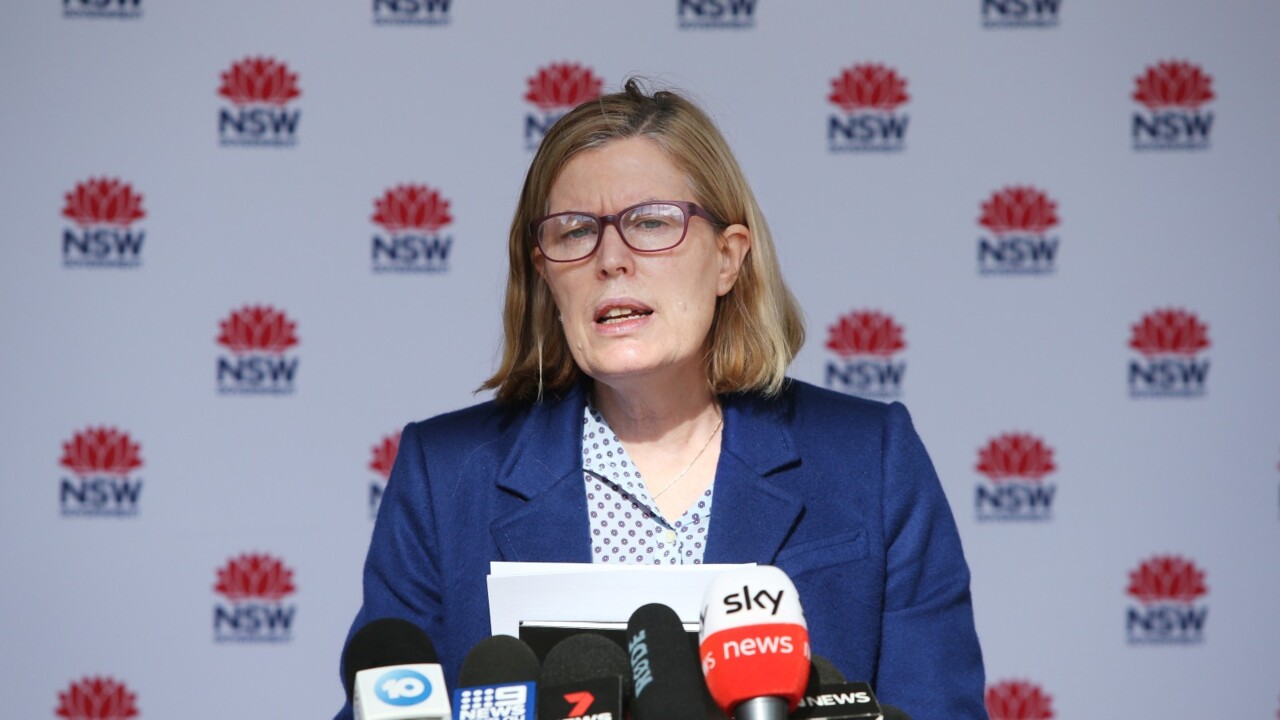
Living with Covid-19 does not mean ignoring the virus, an epidemiologist has warned, as Australia braces for a new wave.
NSW chief health officer Kerry Chant this week urged people to get a booster vaccine, with Omicron sub-variants BQ. 1 and XBB expected to overtake BA. 5 as the dominant variants in Australia.
“We’re starting to see an increase in Covid-19 cases and changes in the variants circulating in NSW, which tells us that we’re entering the next Covid wave,” she said.
“By looking at all the local information we have, and what’s happening overseas, we believe Covid cases will rise in the coming weeks.”
Her comments came after Victorian chief health officer Brett Sutton said there were “indicators” to show “we are at the start of another Covid-19 wave”.
Professor Sutton’s weekly report warned the rise in cases of the subvariants was concerning due to their “ability to escape immunity from past infection” and “waning immunity from past vaccination”.
The XBB strain, which is resistant to vaccines and antibodies from previous infections, began to appear in Singapore last month.
The World Health Organisation said there was no epidemiological data to suggest an increase in disease severity due to the variants.
But Australia’s health experts remain concerned.
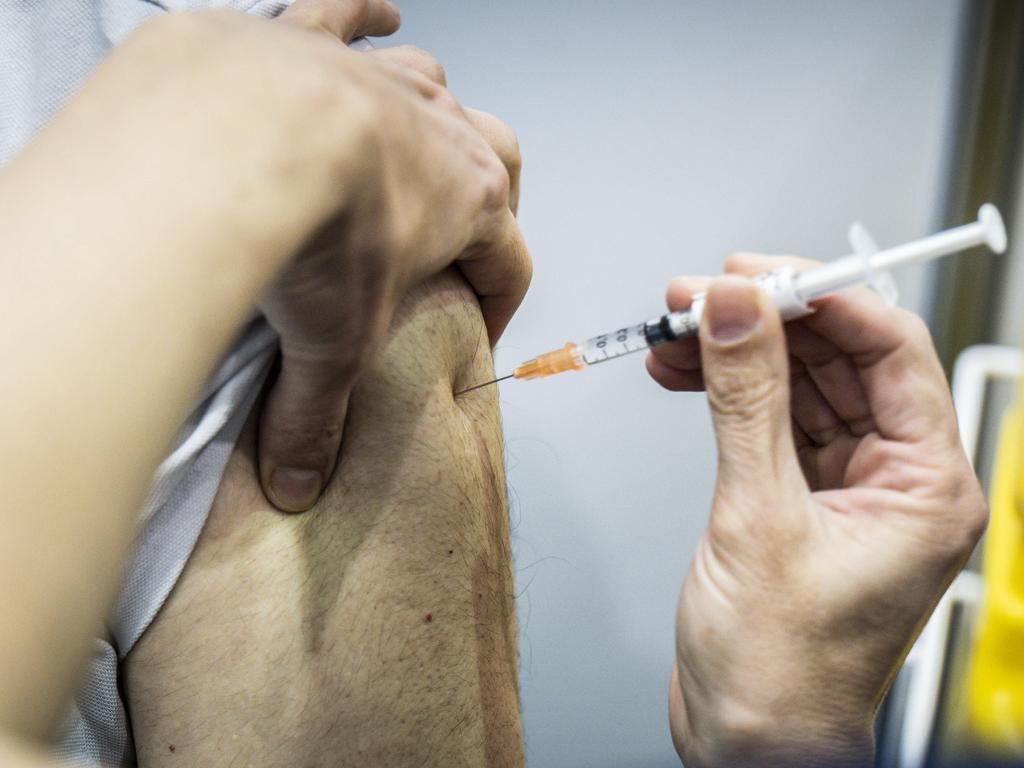
Professor Sutton said the week-by-week rolling average of hospitalisations had increased by 34 per cent, indicating a further wave of Covid-19 has already started in Victoria.
He said antiviral prescriptions has also increased 25 per cent in the past week, further showing infections are up.
However, he noted hospitalisations are now a better indicator of disease activity than cases.
What was the Covid-19 data for this week?
Every jurisdiction now reports on Covid-19 cases weekly, rather than daily.
This week, NSW recorded 24 deaths, which is an increase from 16 last week.
There were 12,450 new cases compared to 10,050 cases last week.
Hospitalisations fell slightly, with 809 patients in hospital compared to 820 last week.
Intensive care admissions are also down, from 25 to 17.
Victoria recorded 24 deaths this week and 10,226 new cases, which is an increase from 8537 last week.
There are 231 patients in hospital, which is up from 172 last week. Seven people are in intensive care.
Queensland reported 14 deaths, which is down from 18 last week, as well as 4427 new cases, following 4447 last week.
Hospitalisations remain at 105, while the number of people in intensive care has increased to three.
COVID-19 weekly update – Friday 4 November 2022
— NSW Health (@NSWHealth) November 3, 2022
In the 7 days to 4pm Thursday 3 November:
-12,450 new cases of COVID-19 have been recorded: 5,599 rapid antigen tests (RATs) and 6,851 PCR tests
-24 lives lost pic.twitter.com/yNUmdfR4tc
Western Australia reported 6916 new infections, with 142 people in hospital, including three in intensive care, which is down from eight.
Seventeen deaths were recorded in the past week in WA.
South Australia recorded 29 deaths and 3797 new cases, with 53 people in hospital, including six in intensive care.
The ACT recorded one death and 910 new cases, with 37 people in hospital, including one in intensive care.
The Northern Territory reported two deaths and 242 new infections, with 15 in hospital.
Tasmania recorded five deaths and 1307 new cases, with eight patients in hospital.
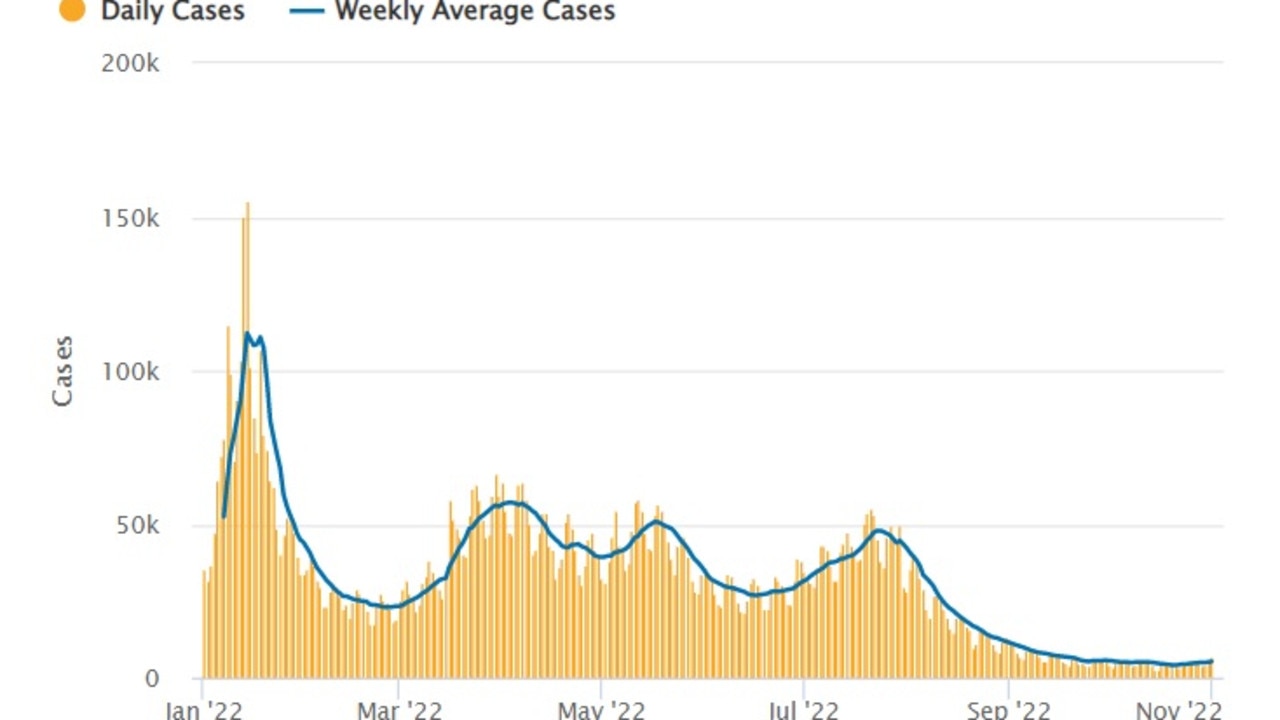
What rules have changed?
Aside from urging people to get their booster vaccines, some states have made other changes this week.
In Queensland, new regulations were introduced as the pandemic powers of the chief health officer John Gerrard came to an end.
The traffic light system has varying levels of protection, with the current green level including rules such as staying home if sick and wearing a mask for seven days after receiving a positive test.
The amber tier will be brought on when there are “moderate rates of community transmission” such as entering a new wave.
It will include wearing a mask indoors if you cannot socially distance and on public transport, as well as taking a rapid antigen test every two days if a household member tests positive.
When rates of transmission are high, the red tier will be brought on and indoor mask-wearing will be mandated.
In WA, the state’s controversial Covid-19 state of emergency finally came to an end on Friday after 963 days.
A temporary declaration remains up the sleeve of the government if needed.
The declaration can be made for three-month periods at a time, but does not allow for the closure of state borders or require an application to enter WA from any other jurisdiction.
It can be used though to implement measures such as mask wearing in certain settings, isolation requirements, enhanced cruise ship protocols and prohibitions to remote Aboriginal communities.

Have we become complacent about Covid-19?
Deakin University Associate Professor of epidemiology Hassan Vally told NCA NewsWire there was undoubtedly a degree of complacency which had crept in among some people.
“Perhaps it is understandable, given how where we are now compares with where we have been since March 2020,” he said.
“There’s a fine line to be navigated in acknowledging that things have improved considerably, which allows us more freedom to live our lives in the way we would prefer, but at the same time, that Covid still poses a significant threat to our health.
“So we must not drop our guard and we need to recognise that adapting to living with Covid, which is what we do have to do, is not the same as ignoring Covid.”
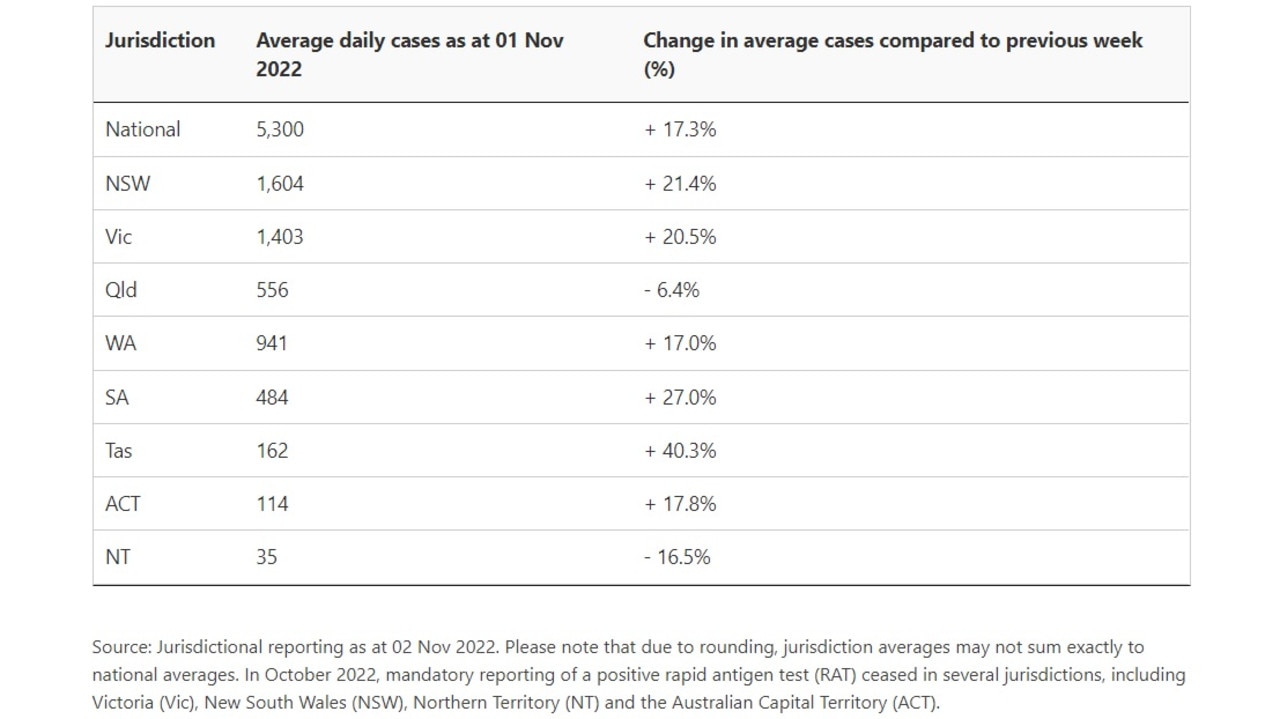
Should we be concerned about this new wave?
Dr Vally said recurring waves were going to be a feature of Covid-19 for some time to come and people needed to be prepared.
“There is no doubt that we are expecting an increase in cases in the coming weeks, signalling the arrival of yet another wave,” he said.
“The new variants BQ. 1 and XBB are driving an increase in cases and hospitalisations overseas, and we expect to see the same in Australia.
“This is a timely reminder that the time for Covid posing a significant public health threat is not over, even though we are clearly transitioning to another phase of the pandemic.”
Dr Vally said people did have a built-up immunity through vaccination and infection had changed the threat of the new variants in a significant way.
“Overseas data seems to suggest that these new waves are shorter and have lower rates of less severe illness associated with them,” he said.
“However, the ability of new variants to evade immunity and the waning of existing immunity mean that we can’t drop our guard.”
This week we reported 10,226 new cases, averaging 231 daily hospitalisations and 7 daily ICU admissions.
— VicGovDH (@VicGovDH) November 3, 2022
24 deaths were reported in the past 7 days.
Our thoughts are with those in hospital, and the families of people who have lost their lives. pic.twitter.com/iA9RTKhDLp
What do people need to do to remain safe?
Dr Vally warned everyone should ensure they are up to date with their vaccinations and get their boosters when due.
“Those in the most vulnerable groups need to be proactive and have a plan in place for accessing antiviral medicines if they are to become unwell, as these have been found to be incredibly effective at preventing severe illness if taken in a timely fashion following the onset of symptoms,” he said.
“We should all also aim to minimise our risk of being infected and infecting others where we can.
“Of course, if you do become ill, you need to do all you can to prevent spreading infection, which includes isolating, as well as wearing a high quality mask if you do have to leave the house when you are unwell.”
But Dr Vally said there was still reason to be optimistic.
“We are on a clear path towards moving away from the emergency response phase to treating Covid as we do other infectious diseases,” he said.
“This is no way to be equated with ignoring Covid, but it simply means that we need to respond to Covid in a way that doesn’t involve huge societal disruptions, but relies on the sensible use of the significant number of tools we have in our disease control toolkit in order to reduce the risks we face from this disease.”


